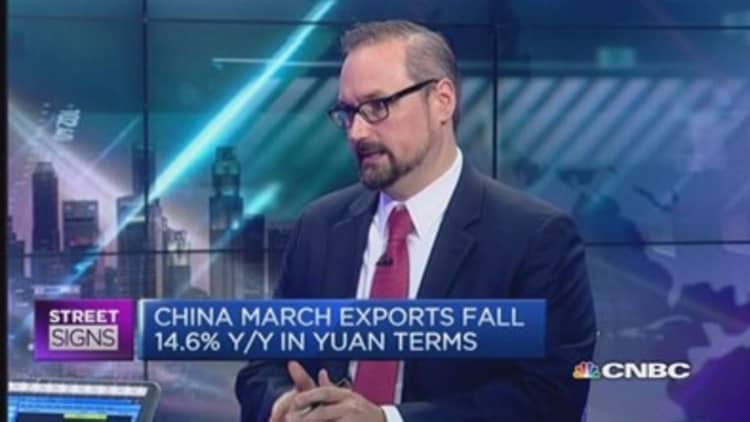China's insistence on a strong yuan has come under widespread criticism and pressure, but Beijing is likely to maintain the currency in a tight band for most of the year until it's internationally recognized, according to one expert.
Some market-watchers have pinned the blame on the country's policy of keeping the value of the artificially high, thereby making it more expensive for China's companies to export.
China's economic growth has been slowing: in early March, Beijing cut its gross domestic product (GDP) growth target to "around 7 percent" for 2015, the lowest level in 11 years, and, ahead of Wednesday's first-quarter GDP figures, official data on Monday showed China's exports unexpected plummeted 14.6 percent on-year in March.
"Changes in the yuan's effective exchange rate can have significant impact on exports growth and to a lesser extent, gross domestic product (GDP) growth and inflation," said Goldman Sachs in a note published on Monday.
What market price?
But Beijing is keen to keep the yuan strong so that it can wean itself off its dependence on exports and move towards a more services-oriented economy, analysts said.
"A stronger yuan on a trade weighted basis is consistent with efforts to rebalance away from exports to domestic growth," Societe Generale emerging markets strategist Jason Daw told CNBC via email on Monday.

The Chinese authorities have so far resisted pressure, including from the U.S., to take off the artificial controls and let the yuan find its market price.
In fact, the yuan may be over-valued by 20 percent, according to Barclays' Behavioral Equilibrium Exchange Rate model, while the 12-month on and off-shore currency forwards suggest the yuan is over-valued by between 2.8 and 3.3 percent.
The yuan was trading at 6.124 against the U.S. dollar in mid-day trading in Asia on Monday.
Global currency bid
While the currency may be overvalued, and even slowing economic growth, Beijing is likely to keep the yuan in a steady band ahead of what is a key event for the government, analysts said.
In October, the International Monetary Fund (IMF) is expected to decide whether the yuan will be included in its basket of international trade currencies, known as Special Drawing Right (SDR). This would include the yuan as one of the main global benchmark currencies along along with the U.S. dollar, the euro, the yen and the pound sterling.
"Chinese policymakers see the yuan's inclusion in the SDR as a key step towards the yuan's internationalization. A sharp weakening of the currency against the dollar may create more political resistance to yuan inclusion," said Goldman.
And getting into the the SDR basket is likely to override all other concerns, including the possibility of letting the yuan weaken in order to boost exports.
"A sharp weakening of the currency against the dollar may create more political resistance to yuan inclusion…we therefore continue to expect the authorities to take a very cautious approach to managing the currency," Goldman said in the note.


